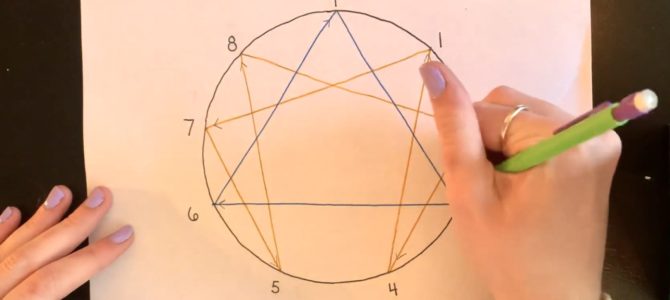
Fad personality quizzes are a dime a dozen, usually harmless, and sometimes even helpful, but rarely do they find themselves so integrated into Christian circles as the enneagram has in recent years.
For the uninitiated, the enneagram is one of those personality rubrics that categorizes people into nine different types, from the “reformer” type one to the “peacemaker” type nine. The nine types are arranged on a circle with lines drawn through the center connecting different types to each other. In addition to your type, you also have a “wing,” which is another type you tend to lean toward.
With any personality rubric, we should be careful with the temptation to pigeonhole ourselves and others into boxes — more on that later — but what makes the enneagram a more relevant topic for examination is its weird relationship with the church, particularly in evangelical circles (and before that, Catholic ones). Christianbook.com sells an aesthetic hardbound book titled “Hearing God Speak: A 52-Week Interactive Enneagram Devotional.”
Other titles like “The Enneagram for Beginners: A Christian Guide to Understanding Your Type for a God-Centered Life” and “The Enneagram from a Christian Perspective: An Enneagram Journey to Self-Discovery and Spiritual Growth” tease a similar message.
A personality test in and of itself might be interesting and even helpful for some, and seem silly or pointless to others — and there would be nothing wrong with that. But Christians, especially those who imbue the enneagram with a spiritual significance, should know its history and its limitations before giving it the pulpit.
Where Did the Enneagram Come From?
Contrary to what you may have heard, the enneagram was not exactly handed down from ancient Christian monks. One of the key players in the “Christianization” of the enneagram was Richard Rohr, a Franciscan priest who authored “The Enneagram: A Christian Perspective” in 1989.
The enneagram “has roots in several wisdom traditions, including Christianity, Judaism, and Islam,” Rohr’s website says. “Seven of the nine Enneagram types are associated with the ‘capital’ or ‘deadly’ sins which originated with the Desert Fathers.” That’s hardly a strong link.
Actually, Rohr’s website admits, “the Enneagram as we know it today” traces back to the 1960s, when Óscar Ichazo was the first to assign the elements of the enneagram to personality types. But Ichazo, notes a draft report from the U.S. bishops’ Secretariat for Doctrine and Pastoral Practices in the National Catholic Reporter, “claimed to have discovered the personality type meaning of the enneagram while in some kind of ecstatic state or trance under the influence of some spirit or angelic being.”
Ichazo, his student Claudio Naranjo, and other followers developed the enneagram and eventually brought it from Ichazo’s school in South America into wider prominence, where it caught on among types like Richard Rohr.
Other names that are often cited in reference to the enneagram’s history include the early 20th century mystics Pyotr Ouspensky and George Gurdjieff, although neither connected it to personality. “The earliest mention of the Enneagram is found in the writings of the Russian occultist P. D. Ouspensky, who attributes it to his teacher, the Greek American occultist [George] Gurdjieff,” writes The Gospel Coalition’s Joe Carter. “Gurdjieff considered the Enneagram a symbol of the cosmos, but made no connection with it to personality types.”
Is the Enneagram Occultist?
In addition to its suspect pedigree, the modern enneagram still isn’t divorced from its New Age-y roots. Many have pointed out the visual similarity between the nine points of the enneagram circle and demonic pentagrams — do with that what you will.
Rohr, on the same page he explains the enneagram’s history, says “The Enneagram is an important aid in helping us gain clear self-knowledge and in awakening to our True Self,” a mystic-sounding promise that should put testers of sound doctrine on edge. Elsewhere, Rohr has claimed that “All reality can now be pictured as an Infinite Outflowing that empowers and generates an Eternal Infolding,” and written of a “Cosmic Christ” who “is much bigger and older than either Jesus of Nazareth or the Christian religion, because the Christ is whenever the material and the divine co-exist—which is always and everywhere.”
And just read this paragraph from the Enneagram Institute, one of the largest outfits promoting the concept:
Because of this particular relationship between the higher qualities of the soul and their corresponding ego distortions, a person could, by using presence and awareness to recognize the pattern of their distortion—their characteristic passion and ego-fixation—come to recognize the quality of Essence that had been obscured. By remembering or contemplating the higher quality, balance could be restored, thus accelerating the person’s awareness of themselves as Essence. Knowing one’s ‘type’ was a way to direct one’s inner work to facilitate the transformative process.
This is baloney at best and false theology at worst. Does that mean that reading about the nine personality types and deciding which one fits you, or following the popular “enneagram and coffee” Instagram account, equates to demonic practice? Of course not.
That being said, Christians should be educated, wise, and prayerful before applying the pop theology of the enneagram to themselves. “Test everything; hold fast what is good,” 1 Thessalonians 5:21 commands.
Idolizing Self-Discovery and Putting People in Boxes
All of its history and baggage aside, can the enneagram be a helpful tool anyway, as a personality test? Some may find that it helps them better understand themselves or others, but caution should make us pause in both applications.
If you’re going to apply the enneagram’s typecasts to others, be wary of putting human souls into pigeonholes. This is a caveat of all personality typecasts, not just the enneagram. People change, sometimes dramatically so. As Christians, we are being sanctified and made more righteous.
If reading a personality description helps you understand your friend in the same way that knowing he’s an extrovert does, there’s likely nothing wrong with that. But be wary of simplifying souls or even discounting their complexity — “Oh, she’s doing that because she’s a seven.”
So what about applying the enneagram to better understand yourself? Maybe it feels eye-opening to read something that “gets” you, or have your tendencies toward strengths and weaknesses spelled out. I’m not saying that can’t have some merit, but don’t be tricked into the cult of self-discovery (or into the temptation of finding your identity in labels).
In a culture that idolizes identity, and seeks it in all the wrong places, the idea of “finding your true self” can be elevated to dangerous heights. Beyond its connection to Eastern mysticism, the practice of “looking inward” can tempt us to worship our own feelings, opinions, and even sins because they are “part of who I am” and therefore must be good.
But the reality is, we are sinful people who must die to self and be born again to be saved. If someone tells you to look to yourself and your “self-discovery” for answers, that person is probably selling a self-help book like Richard Rohr’s.
I’m not going to tell you that it’s sinful to use the enneagram’s personality type descriptions. But before taking the musings of a 1960s shaman to heart — or ascribing them a pseudo-theological value — you should know what you’re getting into.









